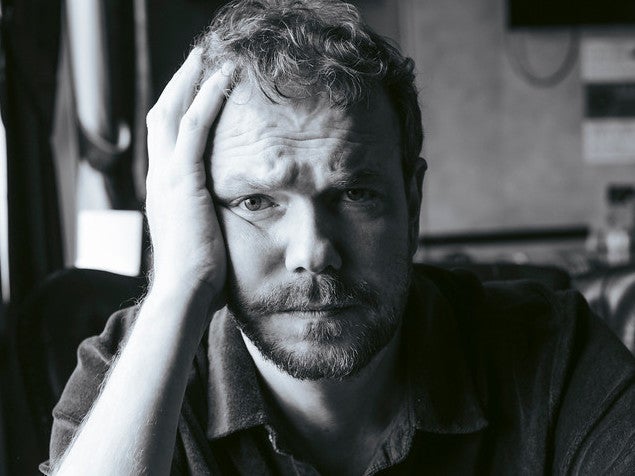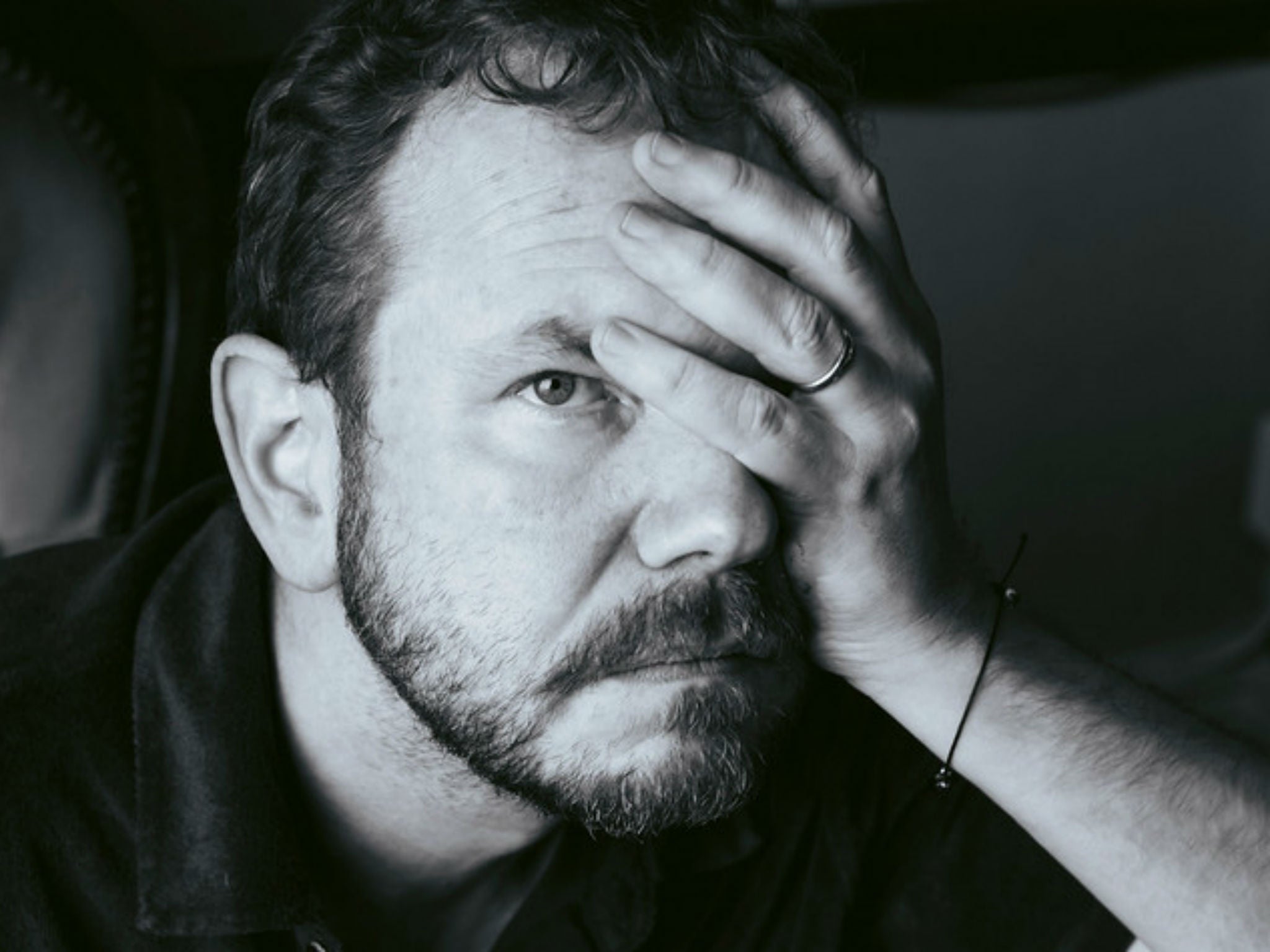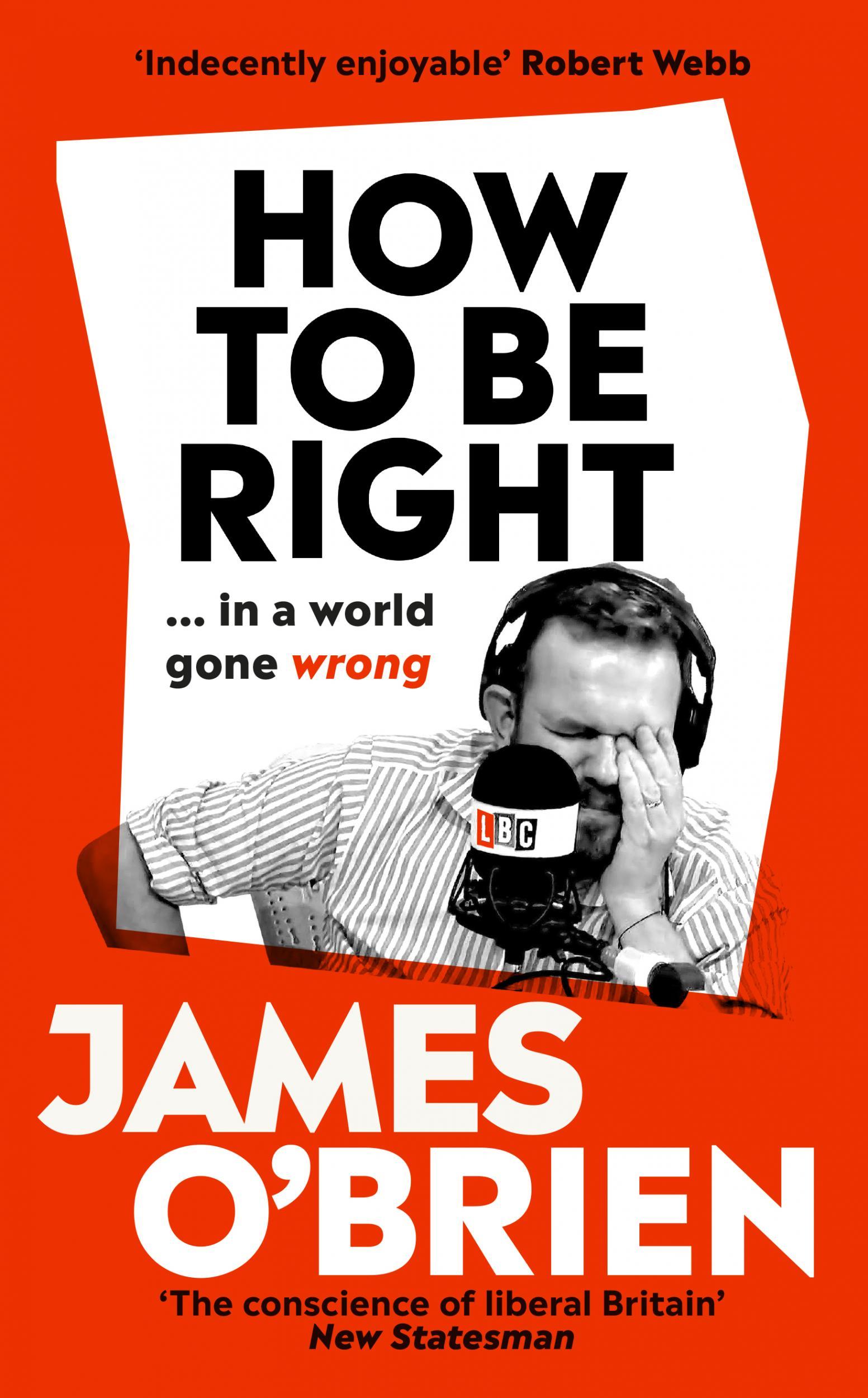James O’Brien interview: ‘Brexit’s been good for my career but bad for my soul’
As he releases his new book ‘How to Be Right...’, the LBC morning show host speaks to Chris Harvey about Brexit, Sean Connery and why he thinks Trump is a fascist

Your support helps us to tell the story
From reproductive rights to climate change to Big Tech, The Independent is on the ground when the story is developing. Whether it's investigating the financials of Elon Musk's pro-Trump PAC or producing our latest documentary, 'The A Word', which shines a light on the American women fighting for reproductive rights, we know how important it is to parse out the facts from the messaging.
At such a critical moment in US history, we need reporters on the ground. Your donation allows us to keep sending journalists to speak to both sides of the story.
The Independent is trusted by Americans across the entire political spectrum. And unlike many other quality news outlets, we choose not to lock Americans out of our reporting and analysis with paywalls. We believe quality journalism should be available to everyone, paid for by those who can afford it.
Your support makes all the difference.James O’Brien is talking about Brexit. He’s been doing this rather a lot since 23 June 2016 on his morning phone-in show for LBC, where his regular dismantling of Leave supporters’ arguments has proved so compelling that clips from the show have repeatedly gone viral on social media. On the back of their popularity, his audience has soared. He’s just published a new book, How to Be Right... in a World Gone Wrong, and he’s looking relaxed and confident when he steps into a small studio, off air, with a large mug of herbal tea.
“Brexit’s been very good for my career,” he says, “but it has been very bad for my soul. Given the choice, I’d rather still be broadcasting to half a million listeners and not being interviewed by The Independent, not have a book out and there be no Brexit, actually, hand-on-heart, because it is a country my children will grow up in and I’m hoping to be around for a few years yet.”
His listeners will know what happens next. He starts talking about it with a mixture of incredulity and exasperation that starts to heat up into something more volatile. He describes reading an article that said the cabinet was shocked to learn what would happen at our Channel ports in the event of a no-deal Brexit. “I was taking calls from hauliers and people that run companies in Dover about a year ago,” he says. “My listeners have known the facts and the detail for a year about stuff that reportedly shocked the cabinet a fortnight ago.”
Then the buckshot rounds start going off. “I genuinely thought it would turn out that these people do actually know what they’re doing, people like Hannan [the Conservative MEP Daniel Hannan], who’ve spent years insisting that this needs to happen, but they’ve all fallen apart like cheap suits. Every single one of them has ended up either resigning once reality has begun to bite, like Davis or Johnson, or going into self-imposed purdah rather than actually address the problems that they’ve caused, like Liam Fox or Michael Gove.”
Pause. Reload. Andrew Bridgen [the Conservative MP and Leave supporter, who suggested all English people are entitled to Irish passports] and MP Nadine Dorries are picked off as “some of the most profoundly ignorant people ever to disgrace public life”.
Missed one. “No deal is the only way that these people, these Rees-Mogg types, the only way they can avoid admitting that it’s all going to hell in a handcart is by saying, ‘No, it’s absolutely fine, here is another unicorn on the horizon’.”
And then he really starts to get cross, about how “these lying charlatans and these misguided decent people who brought Brexit about, are not yet ready to admit that they’ve made a terrible, terrible mistake and the only question Britain faces now is whether or not they’ll admit it in time to stop it”.

He stops, then adds the rhetorical equivalent of blowing smoke from the top of his gun barrel. “Hmmm, I’m not sure they will.”
At 46, O'Brien has been presenting his own show on LBC since 2003, taking calls on everything from Islamic extremism to male depression. How to Be Right..., which features transcripts from some of the more striking calls, takes on Islamophobia, political correctness, the nanny state, LGBT issues and feminism. O’Brien accepts that in some eyes he’s the very model of the media status quo: white, male, middle aged, privately educated, the son of a journalist. He’s fine with it. “My dad, unfortunately, had been made redundant by The Telegraph in my last year at school, so by the time it came for me, trying to get my foot in the door in Fleet Street, his contacts were diminished or dead, so I got my break in journalism by flogging a suit to John Major while I was working in Aquascutum on Regent Street.”
It was a white suit, for an EU summit in Florence. O’Brien rang up the Express and asked if he could do some shifts instead of being paid for the story. They gave him two. Though he’d not trained as a journalist, he’d been steeped in the methods of old-fashioned reporting: “Dad taught me about talking to people; the phone would never stop ringing, he’d be out and about meeting contacts in the pub. The first pint I ever had was bought for me by the head of West Midlands Serious Crime Squad, when I was 14, in a pub around the corner from my dad’s office. Dad was supposed to be taking me home but he had the sniff of a big scoop.”
O’Brien’s first shift involved attending a big showbiz birthday party for Richard Attenborough to get stories and gossip for the diary pages. “I’ll never forget it,” he says. “The lift doors opened on the first floor of the National Theatre and I couldn’t see a face that wasn’t famous… and I just bottled it. I remember the lift doors closing again.”
He went back to the bar and downed two whiskies before trying again, but next day as the editor brought out photo after photo of celebrities at the party and asked, “Did you talk to them?”, he realised that “I’d absolutely ballsed it up”.
His one shot at redemption was a press reception for British Oscar winners the next day, where it was rumoured that Sean Connery might attend. He did, O’Brien tells me. “As he was for any kid in his twenties who grew up watching James Bond films, Connery was iconic and heroic to me, but… he’s really rude. He turns up, marches past us, completely ignored all the journalists present, and starts stalking down the corridor towards the bit of the party that we weren’t allowed into. Everyone’s calling after him; I had done a bit of research and knew that his son had just made a film of Macbeth, so I shout, ‘Have you seen Jason in Macbeth yet, Mr Connery?’, which I thought was a nice question.
“He doesn’t even turn around, and for reasons I will never know, and I wonder to this day whether or not I would have got into journalism if this hadn’t happened, I called after him, ‘What’s wrong, Mr Connery? Are you a bit jealous that you never got the chance to play the part yourself?’ And he stopped, turned around, all the other journalists suddenly noticed that Connery’s coming back up the corridor, and he comes up to me and he hits me, two fingers, on the end of the nose in a way that actually makes your eyes water. And he goes, ‘I played the part before you were born. Do your f*****g homework, sonny.’ [He does the impression]. And I went, ‘Thank you very much Mr Connery’, and I knew I had a story.”
O’Brien would eventually become showbiz editor, but he says: “I never overcame that anxiety, and there were occasions when I’d be throwing up with nerves before marching into a room and trying to talk to everybody.”
It was a relief to move into broadcasting. He worked on The Wright Stuff for Channel 5 for its first couple of years after it started in 2000, and briefly had his own talk show in 2001, before he began doing stand-in shifts at LBC, which soon became permanent. He was well placed when the station, originally London-only, began broadcasting nationwide in 2014. Does he ever run into fellow talk show host Nigel Farage in the canteen? “Once.” How was that? “I think we sort of nodded and said hello, and I then went and washed.”
Farage, of course, is a public schoolboy who presents himself as the voice of the people, the voice of reason – does O’Brien feel there is any similarity between what they do? His eyes, which are blue and hard to read, level carefully on mine; he is not in the business of running away from confrontational gambits. “No, I don’t,” he says, “because I tell people the truth and I don’t encourage them to hate their neighbours.”
O’Brien went to Ampleforth – sometimes labelled the “Catholic Eton” – in North Yorkshire. The school has since been the subject of a sexual abuse scandal. Was he aware of the psychological and physical abuse that it later became associated with? “I was not aware at Ampleforth of any of my peers being sexually abused by monks. I was at prep school.” (He went to Winterfold House in Kidderminster). “I was too young to do anything about it, but I knew the teacher, he’s in prison now and I knew what he was doing to my friends.
“At Ampleforth, from 13 to 18, I had no idea whether boys my age were being abused. There were monks with a reputation for being a bit gropey, or oddly affectionate, but I don’t think that’s unique to boarding schools or public schools. One of the monks that ended up being convicted, who’s dead now, was one of my favourite teachers. That was very, very hard to process. And then, of course, all the teachers who weren’t implicated in anything, whether monks or members of the lay staff, the scale of what was going on at Ampleforth pollutes those memories as well, because you think, you must have known. You must have looked the other way.”
There’s a frankness to O’Brien that his audiences will recognise, as well as a willingness to listen. His callers, he says, have taught him a lot. We talk about one conversation in the book where a woman rings to talk about the time that a senior partner at her law firm told her in a lift that he loved the way she filled out her jeans, recalling how much it had upset her.
“They’re the ones that make me stop and think,” he says. “I still struggle to move on from the argument that I’ve had on the radio many times that two identical behaviours from two very different men will be greeted very, very differently by the woman on the receiving end. If someone you fancy says something to you, your reaction to it is profoundly different from your reaction if it’s someone you find disturbing and creepy, though it’s exactly the same words.” Has he ever been accused of sexism? “I’d be astonished if any former colleague or friend of mine ever felt I’d behaved inappropriately,” he says.
He’s a married father of two daughters, who are 12 and 10. Is he looking forward to the day when they tell him: oh dad, you’re such a reactionary? “They could rebel against me by joining Ukip,” he frets. “When I was growing up you could talk about anything – and our dinner table is the same, but at the moment we are talking more about Taylor Swift.”
He sometimes wonders how he might have turned out if he hadn’t been adopted. His Irish mother, he says, “like loads of other people in the early 1970s, would have come over and given birth here and then I was adopted at 28 days old”. “It’s not a massive part of who I am. The love and the warmth in our home, between me and my mum and dad and sister, when we were growing up and now between us, is... it’s immense.” He’s never felt the need to contact his birth mother, he says. His father, Jim O’Brien, died six years ago.

A whole chapter of the book is devoted to Donald Trump. On the show, O’Brien has been known to describe him as “basically a fascist in the White House”. We talk about how people used to be criticised for throwing the word around at all and sundry. Does he really believe Trump is a fascist? “Yes, of course he is. He’s said himself he’s a nationalist, you can add very simply ‘white’ to that word. You look at how he talks about women, how he talks about people of colour. Accusing Barack Obama of not being American is absolute entry-level racism.”
Even knowing how many people died because of fascism? “The people that caused all those deaths were fascists before people started dying,” he insists. Does he really think it’s that serious? “No, because I think that the checks and balances of the American constitution and the efforts of Robert Mueller [the special counsel investigating links between Russia and the Trump campaign] and a functioning media should put the brakes on him. And hopefully will, but I’m not 100 per cent confident.”
O’Brien himself gets plenty of flak. He says there are people on Twitter who have “dedicated years” to trolling him. “Some of the biggest trolls are probably stars of my book, people that have rung the programme, have soiled themselves in front of hundreds and thousands of people and will never forgive me for humiliating them quite so profoundly in public; and that’s fine too, but again it sounds probably disingenuous, but I kind of wish they could find something a bit more fulfilling to do, I really do.”
Does he ever feel a bit like a fairground wrestler: roll-up, roll-up, try your luck against James O’Brien? “On a couple of issues,” he says, “like Brexit, or possibly Trump. When the balloon thing happened, that was like, ‘Come and have a go’. Yes, I do sometimes but not often, because it’s a bit irresponsible and a bit disrespectful.” He loves the verbal ding-dong, he says. “I’m more interested in light than heat, but sometimes heat is very, very entertaining and over the years I’ve become quite good at, if you will, knocking out people who want to climb into the ring with me.”
How to Be Right... in a World Gone Wrong, published by WH Allen, £12.99, is out now
Join our commenting forum
Join thought-provoking conversations, follow other Independent readers and see their replies
Comments